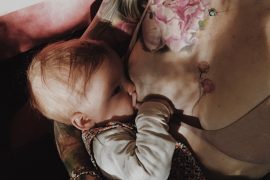I truly believe the Baby Friendly Initiative should be including this in their guidelines for in-hospital care and I would hope that LLL and other organisations would develop breastfeeding-friendly support groups for mothers who wanted to and couldn’t. (I am sure some individual groups and hospitals are doing this, but I do feel it has to be a part of what is offered at a larger, systemic level). When we, the advocates of breastfeeding, push this type of support away onto someone else, we lose so much because others often – as we have seen – don’t actually help women grieve, but push the other negatives (those nasty breastfeeding advocates are trying to hurt you yet there’s really no support for breastfeeding as being best so we need to focus on all infant feeding so you don’t feel “shame”). If we want to help, we have to take on that one more thing here too (yes, I know how much there is to be done still just for those mothers who are breastfeeding and we only have so much to give, but I want to propose that this is an area that would help overall even though we don’t have to).
I want to be clear that by no means do I advocate that this problem of lack of support is caused by breastfeeding advocacy. I don’t believe it even morally needs to be the job of breastfeeding advocates.
It is, however, a failure by our society and exists in more realms than breastfeeding, but it is an area that can be taken up by those who advocate for breastfeeding in a way that I believe would be more sensitive and aware than by others.)
Just look at what has actually happened with women who wanted to breastfeed: They are bombarded with messages of how breastfeeding isn’t all that great so they really have nothing to be sad about. Not only is this horribly dismissive of a mother’s actual feelings, but it doesn’t actually help. We end up with women who continue to be angry and defensive because their actual grief is just suppressed even more. They are unable to look at something like World Breastfeeding Week – a week that does kind of celebrate those who breastfeed, but whose work is dedicated to removing the barriers to some of the most vulnerable populations in the world where breastfeeding can be the difference between life and death[4] – for what it is, instead seeing it through their own experience.
On an individual level, I ask each and every one of you to sit down and comfort a friend who wanted to breastfeed and couldn’t.
Let them rant and rage if needed. It’s helpful to know the stages of grief:
- Shock is sometimes not in this because the realisation that many women aren’t going to breastfeed comes slowly.
- Denial may be seen by mothers trying every last thing to accomplish breastfeeding, but this too may not be present, depending on how much agency a woman feels she has (a sad reflection on how much agency we take away from new mothers that not all women go through denial, but just resign themselves to what someone with a white coat tells them).
- Anger certainly comes out and when they are supported by those who are also angry, that anger turns not against the systems and society that failed them, but the people who are actually fighting to try and avoid the same problems happening to someone else.
- Bargaining can be seen in the “fed is best” movement. It’s not that big a loss if everything is equal, right? The fight for World Infant Feeding Week can be seen as a type of bargaining. The problem is that it just doesn’t hold.
- As mentioned above, we know there is an increased risk of Depression when women who wanted to breastfeed, couldn’t. This is where we can offer the most support to fellow mums. Let them be sad. It’s as hard and as simple as that. You can’t will away their pain and you can’t rationalise it away; it simply has to be felt and supported. Hug them, hold them, sit with them, and just let them know that it’s okay to feel this way, but that it won’t last forever.
- In the Testing stage, you actually have the chance to help them find solutions. Maybe it’s feeding with a supplementary nursing system to mimic breastfeeding. Maybe it’s feeding skin-to-skin. Maybe it’s nothing extra at all. But for each mother, having someone to talk about their ideas with can help and it starts with knowing exactly what it was that was important about breastfeeding to them. Depending on the answer to that, you can help them test different solutions.
- The stage that so few women have actually reached because they are trapped between Anger and Depression. We have to change that.
So no, World Infant Feeding Week should not be a thing. But more than that, Ms. Leppard, you should never have had to feel that it should be.
References
[1] Castro Dias C, Figueiredo B. Breastfeeding and depression: a systematic review of the literature. Journal of Affective Disorders 2015; 171: 142-54.
[2] Ystrom E. Breastfeeding cessation and symptoms of anxiety and depression: a longitudinal cohort study. BMC Pregnancy and Childbirth 2012; 12: 36.
[3] Borra C, Iacovou M, Sevilla A. New evidence on breastfeeding and postpartum depression: the importance of understanding women’s intentions. Maternal and Child Health Journal 2015; 19: 897-907.
[4] See this year’s action folder here to see how it focuses on breastfeeding in times of crisis and poverty: http://worldbreastfeedingweek.org/actionfolder/
Originally published here.
Tracy Cassels, PhD is the Director of Evolutionary Parenting, a science-based, attachment-oriented resource for families on a variety of parenting issues. In addition to her online resources, she offers one-on-one support to families around the world and is regularly asked to speak on a variety of issues from sleep to tantrums at conferences and in the media. She lives in Prince Edward County, Ontario, Canada with her husband and two children.










